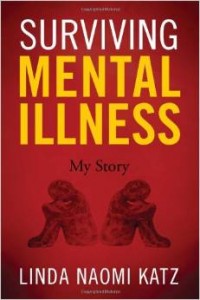The Birth of a Healer
‘Surviving Mental Illness” by Linda Naomi Katz
By Holly Alexis Sisson June 10, 2014
In the digital age of snapshots and youtube videos, decentralized news sources and social media, where the minds of so many can connect at the drop of a wifi connection the mental health field is quickly diverging into the many voices of our global human village. We can see this in Brene Brown’s Ted talk on the power of vulnerability (https://www.ted.com/talks/brene_brown_on_vulnerability), in the critical examination of the inter-sectionalities of human existence in academia, the changing way our hi-tech world influences how we relate to ourselves and each other, and in the return to an earth-based indigenous worldview where each individual is vital to the whole and one person’s illness is a reflection that something is out of balance in the entire community. The will of one to break down the barriers of stigma, ignorance, misunderstanding, systematization of models of illness and health affects the many.
The modern field of psychology is taking bounds and leaps from a model of pathology and illness to a model of health and wholeness that changes the very foundation that guides us in our search for mental health as individuals, communities and a global village. Linda Naomi Katz so valiantly brings to us her own journey of recovering her health and wholeness as she recounts her persistence as a strong woman suffering from a diagnosis of bipolar disorder in her book, Surviving Mental Illness: My Story. Her recovery from illness in a world of hyper-individualism and standardized models of health reveals a powerful message in times of extraordinary transformation of the human consciousness that hope is alive and well.
One of the many gifts Mrs. Katz offers is the wisdom she has gained through her process of self-discovery. The ups and downs she was faced with in her life were responded to with a maturity that precedes her diagnosis of illness, and that many of us with or without pathological diagnoses would have responded to in a similar way. Hers is one story of recovery from being born in a sea of the many voices of our day. Mrs. Katz shares her realization that recovery is lifelong and different for everybody. She says, “my definition of recovery is to ‘live life.'” And, I would have to agree with her. Emerging from all of the modern linear thinking and treatment of mental health issues with this as her understanding is simply an act of healing herself wholly.
In this autobiographical piece, Linda Naomi Katz details her journeys through the modern world seeking healthy interpersonal relationships- especially those with others who were diagnosed with mental illness. She shares her Jewish faith and practices in the face of a mental health system in deep transformation from a state of being steeped in stigma. Mrs. Katz provides specific information about the support she received from therapy and therapists in her area as well as the effects of prescription drugs both in search of mental health and in the lengthy process her and her husband went through in hopes of getting pregnant that ended in the decision to live life child-free. She shares her grief and fears when confronted with her mothers death who suffered from depression and played a key part in her daughters understanding and beliefs around her own diagnosis of bipolar disorder. Linda is an extremely strong woman empowered by living her life; she tells us after losing her father a short time later, “a parent never really dies as long as they remain in your heart.” This simple, yet profound understanding of grief and loss is exactly what our world needs in this time of expanding consciousness and maturing out of a one-dimensional state into a dynamic interplay with a multi-dimensional experience- as humans on a conscious planet.
What really struck me about Mrs. Katz’ process to recovering her mental health and wholeness is that she walked through the mental health system hand in hand with her faith as an observer of the Jewish religion. Not only were her descriptions of Jewish practices interesting, but the concept that her journey was made possible only with the guidance of a belief system that supported her not only on a logical empirical basis but also engaged her as a whole person- a spiritual being having a human experience.
In my field of practice with indigenous and Shamanic ways of knowing and being in relation with my world and the world we share, I see Linda’s journey as a beacon of hope for a mass of people steeped in a system of segregation and dominating forces. I recently had the pleasure of working at a retreat with Malidoma Some, Shamanic healer from the Dagara people of West Africa. Malidoma, whose name means “friends with the stranger”, believes that mental illness signals “the birth of a healer” (http://earthweareone.com/what-a-shaman-sees-in-a-mental-hospital/).
Linda is a peer advocate and healer for others who have struggled with DSM diagnoses in the mental health field. My hopes for her and all whom she touches is that they begin to recognize themselves as healers and see past the stigma to a ray of hope that can only grow to affect positive transformation for their communities and the world.

